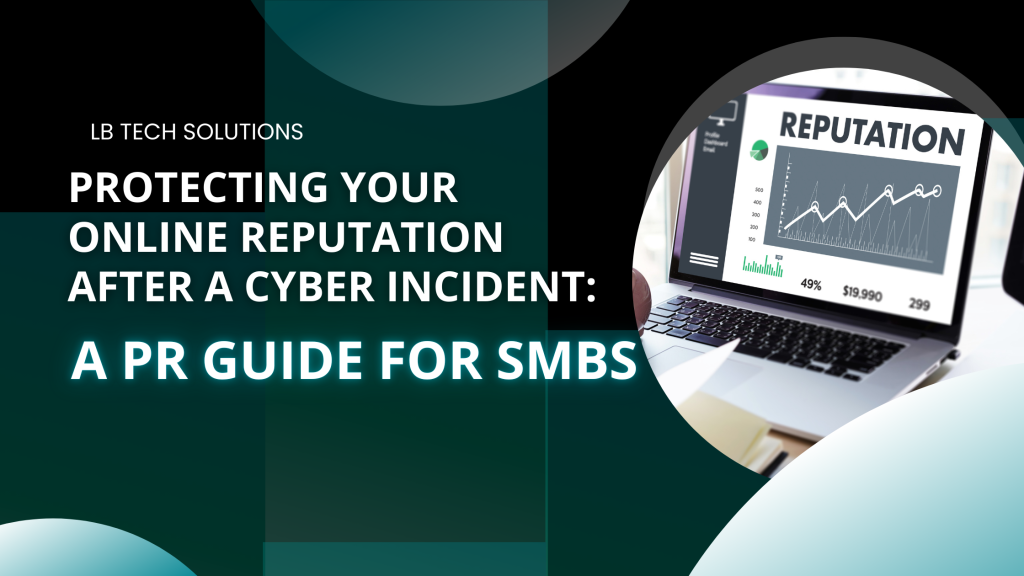A cyber incident can greatly damage the online reputation of a UK small or medium business (SMB). How you respond to such incidents plays a very important role in reducing long-term damage to your brand. This PR guide outlines strategies to manage and protect your online reputation after a cyber incident.
Why Protecting Your Online Reputation Matters
- Reputation Impact
- A cyber incident can tarnish your brand’s credibility and customer trust.
-
- Negative publicity spreads quickly through social media, reviews, and news outlets.
-
- Protecting your reputation helps keep customer loyalty and trust.
- Business Continuity
-
- A strong reputation aids in customer retention and helps attract new business.
-
- Protecting your reputation is vital for keeping smooth operations post-incident.
-
- Businesses with a good reputation are more resilient during a crisis.
- Legal and Financial Consequences
-
- A tarnished reputation can lead to legal repercussions.
-
- Financial losses may include reduced sales, lost customers, and increased costs for remedial actions.
-
- Managing your reputation can mitigate these financial risks.

PR Strategies for Managing Online Reputation After a Cyber Incident
1.Immediate Response
- Acknowledge the Incident: Quickly acknowledge the incident on your website, social media, and through press releases.
- Be Transparent: Provide clear information about the incident, what data was compromised, and the steps you are taking to resolve it.
- Offer Reassurance: Communicate the steps being taken to strengthen security measures and prevent future incidents.
2. Engage with Customers
- Communicate Proactively: Keep customers informed about the steps you’re taking to protect their data.
- Apologize: Offer a sincere apology to those affected.
- Reassurance Messaging: Emphasize your commitment to protecting customer data and their interests.
- Provide a Point of Contact: Offer a direct way for customers to reach out with concerns or questions.
3. Manage Social Media
- Monitor Social Media Channels: Keep an eye on what customers and the public are saying.
- Respond Quickly: Address comments, questions, and concerns promptly.
- Use Social Listening Tools: Use tools like Hootsuite or Brandwatch to check mentions of your business and track sentiment.
- Positive Reinforcement: Share updates on how the situation is being addressed and showcase any new security measures.
4. Leverage Media Relations
- Contact Media Outlets: Reach out to local and industry-specific media to provide an official statement.
- Prepare Key Messages: Develop key messages for media interviews that emphasize your commitment to security and transparency.
- Crisis Communication Plan: Have a crisis communication plan ready, detailing spokespeople, talking points, and procedures for handling media inquiries.
5. Customer Support and Community Engagement
- Enhance Customer Support: Provide clear, accessible customer support channels.
- Engage with Customers: Keep communication lines open with affected customers and offer added support if needed.
- Community Involvement: Engage with the community through blog posts, social media updates, and customer forums to rebuild trust.
- Feedback Mechanisms: Use feedback mechanisms to address concerns and show that you are listening.
6. Post-Incident Recovery and Rehabilitation
- Strengthen Security Measures: Implement added security measures to prevent future incidents.
- Rebuild Trust: Prove a commitment to customer data protection through actions and improvements.
- Customer Communication: Keep customers updated on changes and improvements to security.
- Reputation Management Tools: Use tools like Google Alerts to check your business’s online presence and proactively manage negative mentions.
The Benefits of Managing Your Online Reputation After a Cyber Incident
- Maintain Customer Trust: Protect customer loyalty and confidence.
- Minimize Financial Impact: Limit financial losses by proving a proactive response.
- Strengthen Brand Image: Turn a negative situation into an opportunity to showcase your commitment to security.
- Improve Crisis Preparedness: Be better prepared for future incidents.
Managing your online reputation after a cyber incident is essential for any UK SMB. By responding fast and effectively, you can minimize damage and rebuild trust with customers and stakeholders.
Need help managing your online reputation after a cyber incident? Book a free consultation today to discuss your specific needs and create a plan for protecting your business’s reputation.




